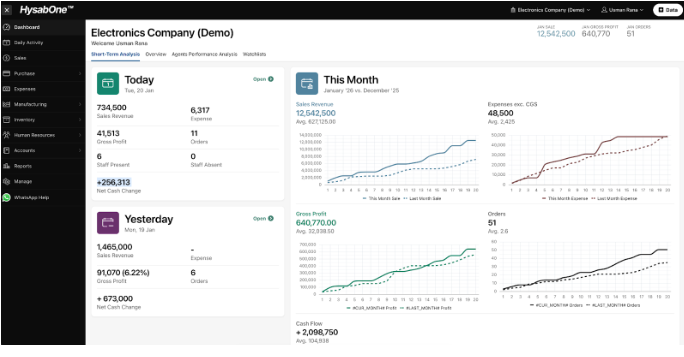Sales Tax Vs Income Tax in Pakistan: A Business Owner's Guide
Running a business in Pakistan comes with several tax responsibilities, and two of the most important ones are sales tax and income tax. Understanding the differences between them is critical for compliance and effective financial management. This guide will breakdown the key differences, commitments, and suggestions of both taxes for business owners in Pakistan.
What is Sales Tax?
Sales tax is an incidental tax levied on the sale of goods and convinced services. Businesses act as tax hoarders by charging sales tax to customers and then sending it to the Federal Board of Revenue (FBR) or related provincial tax authorities.

Sales Tax Rates in Pakistan
The general sales tax (GST) rate in Pakistan is 18% on most goods. However, different rates apply depending on the category of goods or services:
Category | Rate |
General goods and imports | 18% |
Services such as banking, telecom, consulting | 16%, 15%, 13% |
Local imports, export-related items, sugar, machinery | 10%, 8%, 5%, 3% |
Petroleum, metals, chemicals | 18.5% – 25% |
Exports, office stationery | 0% |
Pharmaceuticals, books, agricultural produce | Exempt |
Who Needs to Register for Sales Tax?
- Manufacturers, retailers, importers, and wholesalers with a turnover exceeding PKR 7.5 million (for retailers) or PKR 50 million (for service providers)
- Businesses supplying taxable goods or services in Pakistan
- Online sellers and eCommerce businesses (depending on economic nexus rules)
Compliance Requirements
- Sales Tax Invoices: Businesses must issue proper invoices including supplier/customer details, tax numbers, and breakdowns.
- Filing & Payment: Monthly tax returns must be submitted to the FBR.
- Withholding Tax Agents: Some businesses are required to withhold a portion of the sales tax before making payments to suppliers.
What is Income Tax?
Income tax is a direct tax levied on the income earned by individuals and businesses. Unlike sales tax, which is collected at the point of sale, income tax is paid on profits earned by a business or an individual.
Income Tax Rates in Pakistan
The income tax rate varies depending on whether the taxpayer is an individual, partnership, or corporation:
Category | Tax Rate |
Individuals (Annual Income below PKR 600,000) | 0% |
Individuals (PKR 600,001 – 1,200,000) | 2.5% |
Individuals (PKR 1,200,001 – 2,400,000) | 12.5% |
Individuals (Above PKR 2,400,000) | Up to 35% |
Companies | 29% |
Small Businesses (Turnover under PKR 100 million) | 20% |
Who Needs to Pay Income Tax?
- Salaried individuals earning above PKR 600,000 per year
- Self-employed professionals and freelancers earning taxable income
- Companies, partnerships, and AOPs required to pay tax
- Startups and digital ventures that cross the taxable limit
Compliance Requirements
- Annual Tax Filing: It is mandatory for individuals and businesses to file their tax returns with the FBR each year.
- Advance Tax Payments: Some businesses must remit advance tax payments on a quarterly basis.
- Withholding Tax Deduction: Businesses are responsible for withholding tax on payments like salaries and contractor fees.
Key Differences Between Sales Tax and Income Tax
Feature | Sales Tax | Income Tax |
Nature | Indirect tax on sales of goods/services | Direct tax on income and profits |
Who Pays? | Collected from customers and remitted by businesses | Paid directly by individuals and businesses |
Rate | Varies (3%-25%) | Varies (2.5%-35% for individuals, 29% for corporations) |
Payment Frequency | Monthly | Annually (or quarterly for advance tax) |
Regulatory Authority | FBR & Provincial Tax Authorities | FBR |
Nexus Rule | Based on place of business, warehouse, or online sales | Based on residence and source of income |
Which Tax Affects Businesses More?
For greatest businesses,sales tax compliance is more frequent and needs monthly filings. But, income tax impacts overall profitability, and failure to fulfil can lead to severe penalties. Understanding both is crucial for financial planning.
How to Ensure Compliance?
- Register with FBR – Obtain a Sales Tax Registration Number (STRN) and National Tax Number (NTN).
- Keep Proper Records – Maintain invoices, sales receipts, and expense records.
- File Returns on Time – Submit monthly sales tax returns and annual income tax filings.
- Consult a Tax Professional – Get expert advice to avoid penalties and optimize tax savings.
Final Thoughts
Both sales tax and income tax play essential roles in Pakistan’s tax system. As a business owner, understanding these taxes will help you stay obedient, avoid penalties, and achieve your finances effectively. Whether you’re a seller, service provider, or eCommerce seller, staying on top of your tax responsibilities is key to running a successful business.
Need professional assistance? Consult a tax advisor to ensure compliance and maximize your tax benefits!
Latest posts
-
 How Digital Tools Support Pakistani Tax Professionals: Income Tax Return Filing Made Easier27 Jan 2026
How Digital Tools Support Pakistani Tax Professionals: Income Tax Return Filing Made Easier27 Jan 2026 -
 Sales Tax Vs Income Tax in Pakistan: A Business Owner's Guide18 Mar 2025
Sales Tax Vs Income Tax in Pakistan: A Business Owner's Guide18 Mar 2025 -
 Divorce Lawyers: Family Lawyers & Divorce Lawyers in Karachi21 Nov 2024
Divorce Lawyers: Family Lawyers & Divorce Lawyers in Karachi21 Nov 2024 -
 Court Marriage in Islam and Pakistan – Islamic and Legal Perspective16 Nov 2024
Court Marriage in Islam and Pakistan – Islamic and Legal Perspective16 Nov 2024 -
 Company Registration | Company Registration in Karachi, Islamabad/Rawalpindi & Lahore, Pakistan20 May 2024
Company Registration | Company Registration in Karachi, Islamabad/Rawalpindi & Lahore, Pakistan20 May 2024 -
 Banking Law in Pakistan20 Oct 2023
Banking Law in Pakistan20 Oct 2023 -
 Tax Lawyer in Pakistan19 Oct 2023
Tax Lawyer in Pakistan19 Oct 2023 -
 Is Online Nikah or Online Marriage Legal in Pakistan, Valid in Islam18 Aug 2023
Is Online Nikah or Online Marriage Legal in Pakistan, Valid in Islam18 Aug 2023 -
12 Tables (Twelve Tables) of Ancient Roman Law14 Oct 2022
